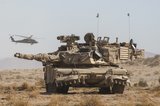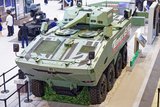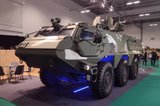CAR asks UN to approve China arms deliveries
The Central African Republic (CAR) has asked the UN Security Council to approve deliveries of Chinese-made armoured vehicles, machine guns, tear gas grenades and other weaponry for its struggling army and police, according to the request obtained by AFP on 11 June.
CAR Defence Minister Marie Noelle Koyara requested an exemption to an arms embargo, arguing that national forces are ‘confronted with the strength and escalating violence of armed groups whose illegal activities pose a threat to civil order.’
The council imposed an arms embargo on the CAR in 2013 when the country descended into bloodshed but its sanctions committee in 2017 gave the green light for Russia to supply weapons to the national forces.
Council members have until 3:00 pm EST (7:00 pm GMT) of 15 June 2018 to raise objections to the request for the Chinese shipments, according to a letter from the sanction committee's vice-chair.
China is donating the military equipment which includes 12 armoured vehicles and four assault vehicles, 50 pistols, six sniper rifles, ten submachine guns with silencers and some 30 machine guns of various calibres.
The list of equipment from China's Poly Technologies also includes 300 rockets, 500 anti-tank grenades, some 725,000 rounds of ammunition of various types and 15,000 tear gas grenades.
In her request, the defence minister argued that tear gas would help gendarmerie and police deal with crowd control as the ‘units do not currently possess any of this equipment designed to maintain order.’
The request for the Chinese weaponry is backed by a European Union military training mission and by the UN peacekeeping operation MINUSCA, which has come under repeated attacks from armed groups. Five peacekeepers have been killed in 2018.
The CAR exploded into violence following the 2013 overthrow of longtime leader Francois Bozize, prompting France to intervene with its Operation Sangaris.
MINUSCA took over an African Union-led mission in 2014, deploying some 12,000 troops and police, but the country remains overrun with militias, many of whom claim to protect Christian or Muslim communities.
CAR's leaders have repeatedly asked the Security Council to ease the arms embargo to allow shipments of equipment that will beef up the national forces.
France and the UN mine-action service have helped CAR's defence ministry set up armouries and ammunition depots for the deliveries, which the request stated should take place in June 2018.
Koyara wrote: ‘Building up the defence and security forces, alongside MINUSCA, and progressive deployment of those forces safeguards the security of people and ensures the progressive enforcement of state authority.’
Most of the armoured vehicles and other weaponry will be used by special forces trained by Rwanda and certified by the EU training mission. Units of CAR's gendarmerie and police were trained by the UN police.
More from Land Warfare
-
![World Defense Show 2026: Saudi Arabia’s record defence spend highlights uncertain times]()
World Defense Show 2026: Saudi Arabia’s record defence spend highlights uncertain times
Saudi Arabia’s investment in its land forces, notably in the area of air defence as recently as 30 January, is a sign of the challenges the Gulf State faces, particularly the threat from Houthi rebels in Yemen.
-
![Singapore Airshow 2026: ST Engineering’s Terrex s5 highlights hybrid power’s role in future warfare]()
Singapore Airshow 2026: ST Engineering’s Terrex s5 highlights hybrid power’s role in future warfare
Hybrid-electric drive technology may address the growing energy demands of land warfare in future.
-
![CAVS rides a wave and prepares for surge requirements as orders roll in]()
CAVS rides a wave and prepares for surge requirements as orders roll in
The Common Armoured Vehicle System is continuing to rack up orders as the British Army looks likely to become an operator of the vehicle, while Italy and Ireland are also contenders.
-
![US DoD task force’s DroneHunter acquisition lays groundwork for Replicator 2 CUAS strategy]()
US DoD task force’s DroneHunter acquisition lays groundwork for Replicator 2 CUAS strategy
As the US Department of Defense looks to counter the growing threat of uncrewed aerial systems to improve homeland security, the DroneHunter acquisition could point to future commercial innovation.
-
![Land forces review: Tanks, trucks and IFVs dominate but woes remain for Ajax]()
Land forces review: Tanks, trucks and IFVs dominate but woes remain for Ajax
This year has begun with main battle tanks taking the lead while orders for large logistics and support vehicles continued from last year. Additionally, two of the British Army’s most significant contracted vehicle programmes, Ajax reconnaissance vehicle and Challenger 3 tank, continued to make news in January.























